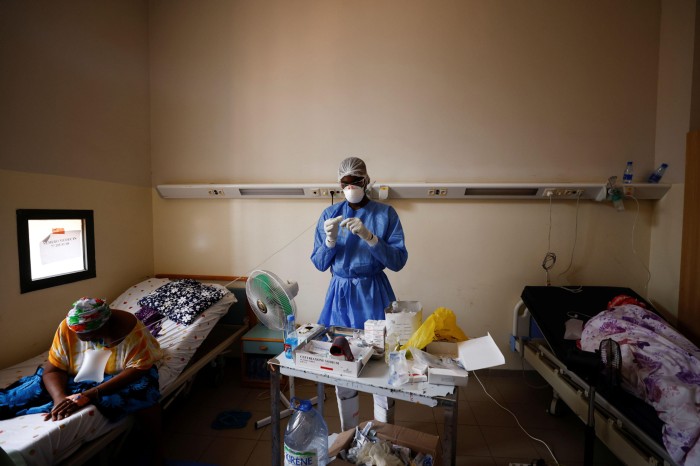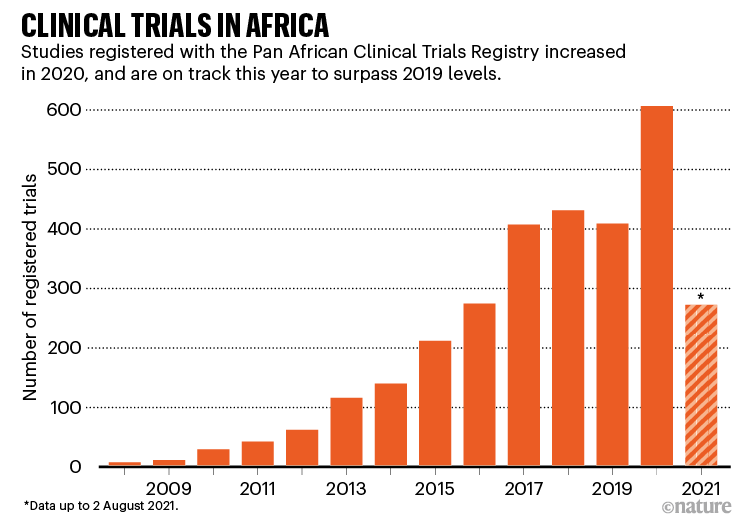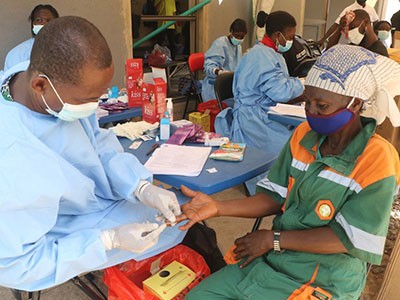In a bid to stave off looming disaster, scientists are trying to repurpose drugs used for malaria and other diseases, but infrastructure and recruitment challenges stymie progress.

A nurse in Senegal treats people who have COVID-19. Credit: Zohra Bensemra/Reuters/Alamy
For more than a year, Adeola Fowotade struggled to recruit people to a clinical trial for COVID-19 treatments. A clinical virologist at University College Hospital in Ibadan, Nigeria, she joined the effort in August 2020, which aims to test the efficacy of a combination of readily available drugs. Her goal was to find 50 volunteers — people diagnosed with COVID-19 who had moderate to severe symptoms and might benefit from the drug cocktail. But the recruitment effort crawled along, even as cases of the virus surged in Nigeria in January and February. After 8 months, she had managed to enlist only 44 people.
“Some patients declined to participate in the study when approached, while some who agreed discontinued midway into the trials,” says Fowotade. Once case rates started to decline in March, it became nearly impossible to find participants. This made the trial, known as NACOVID, difficult to complete. “We were unable to meet our planned sample size,” she says. The trial ended in September, short of its recruitment goal.
Fowotade’s troubles mirror those faced by other trials in Africa — posing a major problem for those countries in the continent that have been unable to secure enough vaccines against COVID-19. Only 2.7% of people in Nigeria, the continent’s most populous country, have been at least partially vaccinated. That’s just slightly lower than the average rate for low-income countries. Estimates suggest that it could take until at least September 2022 for African nations to obtain enough doses to fully vaccinate 70% of the continent’s population.
That leaves few options for fighting the pandemic now. Although wealthy nations outside Africa have used treatments such as monoclonal antibodies or the antiviral drug remdesivir, these need to be administered in hospitals and are expensive. The drug giant
Merck has agreed to license its pill-based drug molnupiravir to manufacturers that would provide broad access to the drug, but questions remain about how costly it will be if it does get approval. So the hunt is on for affordable, readily available drugs for Africa that could reduce COVID-19 symptoms, lower the burden of disease on health-care systems and reduce deaths.
That search has faced numerous hurdles. According to the US-run database clinicaltrials.gov, of nearly 2,000 trials currently exploring drug treatments for COVID-19, only about 150 are registered in Africa, and the vast majority of those are in Egypt and South Africa. The lack of trials is problematic, says Adeniyi Olagunju, a clinical pharmacologist at the University of Liverpool, UK, and the principal investigator for NACOVID. If Africa is largely missing from COVID-19 treatment trials, then the likelihood of it having access to drugs that get approved is very limited, he says. “Add that to the abysmally low access to vaccines,” Olagunju says. “Africa needs effective therapeutics for COVID-19 as an option more than any other continent.”
Some organizations are trying to remedy this shortfall. ANTICOV, a programme run by the non-profit Drugs for Neglected Diseases initiative (DNDi), is currently the largest trial in Africa. It is testing early treatment options for COVID-19 in two trial arms. Another study called Repurposing Anti-Infectives for COVID-19 Therapy (ReACT) — coordinated by the non-profit foundation Medicines for Malaria Venture — will test the safety and efficacy of repurposed drugs in South Africa. But regulatory challenges, a lack of infrastructure and difficulties with recruiting trial participants all present major hurdles to such efforts.
“We have a broken health-care system in sub-Saharan Africa,” says Samba Sow, the national principal investigator for ANTICOV in Mali. That makes the trials hard but all the more necessary, particularly for identifying drugs that will help people during the earliest stages of disease and prevent hospitalizations. For him and many others working on the disease, it is a race against death. “We can’t wait until patients become severely ill,” he says.
Trials on the up
The coronavirus pandemic has given clinical research in the African continent a boost. Vaccinologist Duduzile Ndwandwe tracks research on experimental treatments at Cochrane South Africa — part of the international group that reviews health evidence — and says that the Pan African Clinical Trials Registry registered a total of 606 clinical trials in 2020, compared with 408 in 2019 (see ‘Clinical trials in Africa’). By August this year, it had registered 271, including trials for both vaccines and drugs. “We’ve seen lots of trials expanding with COVID-19,” Ndwandwe says.

Source:
https://pactr.samrc.ac.zaTrials for coronavirus treatments are still lacking, however. In March 2020, the World Health Organization (WHO) launched its flagship Solidarity trial, a global study of four potential COVID-19 treatments. Only two African countries participated in the first phase of the study. Challenges in providing health-care services for severely ill patients precluded most nations from joining, says Quarraisha Abdool Karim, a clinical epidemiologist at Columbia University in New York City who is based in Durban, South Africa. “It was an important missed opportunity,” she says, but it laid the groundwork for more COVID-19 treatment trials. In August, the WHO announced the next phase of the Solidarity trial, which will test three other drugs. Five more African countries are participating.
The NACOVID trial that Fowotade worked on aimed to test its combination therapy on 98 people in Ibadan and three other sites in Nigeria. People in that study were given the antiretrovirals atazanavir and ritonavir, and an antiparasitic drug called nitazoxanide. Even though it didn’t meet its recruitment goal, Olagunju says that the teams involved are preparing a manuscript for publication and are hopeful that the data will provide some insight about the drugs’ effectiveness.
South Africa’s ReACT trial, sponsored by the South Korean drug company Shin Poong Pharmaceutical in Seoul, aims to test four repurposed drug combinations: the antimalarial therapies artesunate–amodiaquine and pyronaridine–artesunate; the influenza antiviral favipiravir, given with nitazoxanide; and sofosbuvir and daclatasvir, an antiviral combination typically used to treat hepatitis C.
Using repurposed drugs is highly attractive to many researchers, because it could be the most viable route to rapidly finding treatments that can be distributed easily. Africa’s lack of infrastructure for pharmaceutical research, development and manufacturing means that countries cannot readily test new compounds and mass-produce drugs. Such efforts are crucial, says Nadia Sam-Agudu, a specialist in paediatric infectious diseases at the University of Maryland in Baltimore, who works at the Institute of Human Virology Nigeria in Abuja. “If effective, these treatments may prevent severe disease and hospitalization, as well as potentially [stop] onward transmission,” she adds.
The continent’s largest trial, ANTICOV, was launched in September 2020 in the hope that early treatments could prevent COVID-19 from overwhelming the fragile health-care systems in Africa. It has currently enrolled more than 500 participants across 14 sites in the Democratic Republic of the Congo, Burkina Faso, Guinea, Mali, Ghana, Kenya and Mozambique. It aims to eventually recruit 3,000 participants across 13 countries.
A man standing in a grave looks on as a horse-cart drops off soil to build new graves in a cemetery in Dakar
A worker in a cemetery in Dakar, Senegal, in August as a third wave of COVID-19 infections hit.Credit: John Wessels/AFP/Getty
ANTICOV is testing the efficacy of two combination treatments that have seen mixed results elsewhere. The first blends nitazoxanide with inhaled ciclesonide, a corticosteroid used to treat asthma. The second combines artesunate–amodiaquine with the antiparasitic drug ivermectin.
Ivermectin, which is used in veterinary medicine and to treat some neglected tropical diseases in humans, has become controversial in many countries. Individuals and politicians have been demanding access to it for the treatment of COVID-19 on the basis of anecdotal and scant scientific evidence about its efficacy. Some of the data supporting its use are questionable. A large study in Egypt that supported administering ivermectin in people with COVID-19 was withdrawn by the preprint server where it was published amid accusations of data irregularities and plagiarism. (The authors of the study have argued they were not given an opportunity by the publishers to defend themselves.) A recent systematic review by the Cochrane Infectious Disease Group found no evidence to support ivermectin’s use for treating COVID-19 infections (M. Popp et al. Cochrane Database Syst. Rev. 7, CD015017; 2021).
Nathalie Strub-Wourgaft, who heads the DNDi’s COVID-19 activities, says there are legitimate reasons to test the drug in Africa. She and her colleagues are hopeful that it might act as an anti-inflammatory when given alongside the antimalaria drugs. And the DNDi is poised to test other drugs if this combination is found lacking.
“The issue of ivermectin has been politicized,” says epidemiologist Salim Abdool Karim, director of the Centre for the AIDS Programme of Research in South Africa (CAPRISA), headquartered in Durban. “But if the trials in Africa can help resolve that or make an important contribution, then that’s a good idea.”
Strub-Wourgaft says that the combination of nitazoxanide and ciclesonide looks promising on the basis of existing data so far. “We have encouraging preclinical and clinical data that supported our selection for this combination,” she says. After an interim analysis last September, Strub-Wourgaft says ANTICOV is preparing to test a new arm, and will continue with the two existing treatment arms.
Barriers and bottlenecks
Getting the trials started was a challenge, even for
the DNDi, which has lots of experience working in the continent. Regulatory approvals presented a major bottleneck, says Strub-Wourgaft. So, ANTICOV collaborated with the WHO’s African Vaccine Regulatory Forum (AVAREF) to set up an emergency process for joint reviews of clinical studies in 13 countries. This could speed up regulatory and ethical approvals. “It allows us to bring countries, regulators and ethics-review-committee members together,” says Strub-Wourgaft.
Nick White, a specialist in tropical medicine who chairs the COVID-19 Clinical Research Coalition, an international collaboration to find solutions to COVID-19 in low-income countries, says that although the WHO initiative is good, it still takes longer to obtain approvals for studies in low- and middle-income nations than it does in wealthy ones. The reasons include strict regulatory regimes in these nations, and authorities that are unskilled at navigating ethical and regulatory review. This is something that has to change, says White. “If countries want to find the solutions to COVID-19, they should help their researchers to do the necessary research, not obstruct them.”
But the challenges don’t stop there. Fowotade says that logistics and inadequate electrical supplies can stall progress once a trial starts. She was storing COVID-19 samples in a −20 °C freezer at the hospital in Ibadan when it experienced power outages. She also needed to transport the samples to a centre in Ede for analysis, a two-hour drive away. “I sometimes feel worried about the integrity of the stored samples,” Fowotade says.

Olagunju adds that recruiting trial participants became even more difficult when some states stopped funding COVID-19 isolation centres in their hospitals. Without those resources, only patients who could afford to pay were admitted. “We planned and started our trial based on the knowledge that the government was responsible for funding isolation and treatment centres. Nobody expected that to be interrupted,” says Olagunju.
And although it’s generally well resourced, Nigeria is notably not a participant in ANTICOV. “Everybody avoids Nigeria to do clinical trials because we are not organized,” says Oyewale Tomori, a virologist and chair of Nigeria’s Ministerial Expert Advisory Committee on COVID-19, which works to identify effective strategies and best practices for responding to COVID-19.
Babatunde Salako, director-general of the Nigerian Institute of Medical Research in Lagos, disagrees with that view. Salako says that Nigeria has the knowledge to conduct clinical trials as well as hospitals for recruitment and a vibrant ethics-review committee, which coordinates approvals for clinical trials in Nigeria. “In terms of infrastructure, yes, it may be weak; it can still support clinical trials,” he says.
Ndwandwe wants to encourage more African researchers to join clinical trials so that its citizens can have equitable access to promising therapies. Local trials can help researchers to identify pragmatic treatments. And they can address the specific needs of low-resource settings and contribute to better health outcomes, says Hellen Mnjalla, a clinical-trials manager at the Kenya Medical Research Institute–Wellcome Trust Research Programme in Kilifi.
“COVID-19 is a new infectious disease, so we need to do clinical trials to understand how these interventions are going to work on African populations,” adds Ndwandwe.
Salim Abdool Karim hopes that the crisis will spur African scientists to build on some of the research infrastructure that had been set up to fight the HIV/AIDS epidemic. “The infrastructure is well developed in some countries like Kenya, Uganda and South Africa. But it’s less developed in others,” he says.
To bolster clinical trials for COVID-19 treatments in Africa, Salim Abdool Karim suggests establishing a body such as the Consortium for COVID-19 Vaccine Clinical Trials (CONCVACT; created in July 2020 by the Africa Centres for Disease Control and Prevention) to coordinate treatment trials on the continent. The African Union — the continental body representing the 55 African member states — is well placed to take that responsibility. “They’re already doing it for vaccines, so that could be extended for treatments too,” says Salim Abdool Karim.
The COVID-19 pandemic, says Sow, can be overcome only through international collaboration and equitable partnerships. “In the global fight against infectious diseases, a country can never go alone — not even a continent can,” he says.
 A nurse in Senegal treats people who have COVID-19. Credit: Zohra Bensemra/Reuters/Alamy
A nurse in Senegal treats people who have COVID-19. Credit: Zohra Bensemra/Reuters/Alamy




Comments
Post a Comment